Related Research Articles

Sherborne Abbey, otherwise the Abbey Church of St. Mary the Virgin, is a Church of England church in Sherborne in the English county of Dorset. It has been a Saxon cathedral (705–1075), a Benedictine abbey church (998–1539), and since 1539, a parish church.

Michaelmas is a Christian festival observed in many Western Christian liturgical calendars on 29 September, and on 8 November in the Eastern Christian traditions. Michaelmas has been one of the four quarter days of the English and Irish financial, judicial, and academic year.

Sherborne is a market town and civil parish in north west Dorset, in South West England. It is sited on the River Yeo, on the edge of the Blackmore Vale, 6 miles east of Yeovil. The parish includes the hamlets of Nether Coombe and Lower Clatcombe. The A30 road, which connects London to Penzance, runs through the town. In the 2011 census the population of Sherborne parish and the two electoral wards was 9,523. 28.7% of the population is aged 65 or older.

Beaminster is a town and civil parish in Dorset, England, situated in the Dorset Council administrative area approximately 15 miles (24 km) northwest of the county town Dorchester. It is sited in a bowl-shaped valley near the source of the small River Brit. The 2013 mid-year estimate of the population of Beaminster parish is 3,100.
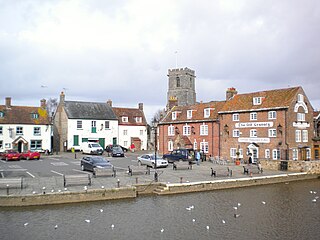
Wareham is a historic market town and, under the name Wareham Town, a civil parish, in the English county of Dorset. The town is situated on the River Frome eight miles (13 km) southwest of Poole.
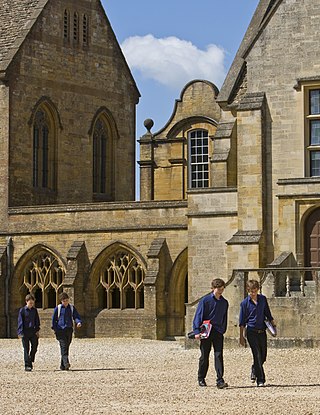
Sherborne School is a 13–18 boys public school and boarding school located beside Sherborne Abbey, in the parish of Sherborne, Dorset. The school has been in continuous operation on the same site for over 1,300 years. It was founded in 705 AD by St Aldhelm and, following the dissolution of the monasteries, re-founded in 1550 by King Edward VI, making it one of the oldest schools in the United Kingdom. Sherborne is one of the twelve founding member public schools of the Headmasters' and Headmistresses' Conference in 1869 and is a member of the Eton Group and Boarding Schools Association.
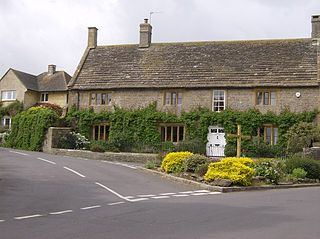
Yetminster is a village and civil parish in the English county of Dorset. It lies 4 miles (6.4 km) south-west of Sherborne. It is sited on the River Wriggle, a tributary of the River Yeo, and is built almost entirely of honey-coloured limestone, which gives the village an appearance reminiscent of Cotswold villages. In the 2011 census the civil parish had a population of 1,105.

Dorset is a rural county in south west England. Its archaeology documents much of the history of southern England.
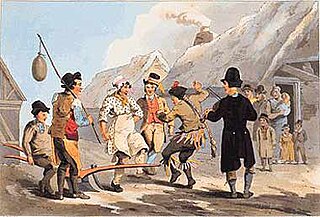
Plough Monday is the traditional start of the English agricultural year. While local practices may vary, Plough Monday is generally the first Monday after Epiphany, 6 January. References to Plough Monday date back to the late 15th century. The day before Plough Monday is referred to as Plough Sunday, in which a ploughshare is brought into the local Christian church with prayers for the blessing of human labour, tools, as well as the land.

Charivari was a European and North American folk custom designed to shame a member of the community, in which a mock parade was staged through the settlement accompanied by a discordant mock serenade. Since the crowd aimed to make as much noise as possible by beating on pots and pans or anything that came to hand these parades are often referred to as rough music.
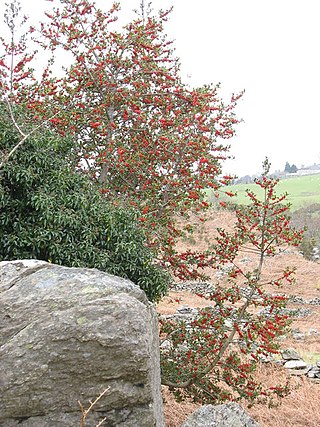
"The Holly and the Ivy" is a traditional British folk Christmas carol, listed as number 514 in the Roud Folk Song Index. The song can be traced only as far as the early nineteenth century, but the lyrics reflect an association between holly and Christmas dating at least as far as medieval times. The lyrics and melody varied significantly in traditional communities, but the song has since become standardised. The version which is now popular was collected in 1909 by the English folk song collector Cecil Sharp in the market town of Chipping Campden in Gloucestershire, England, from a woman named Mary Clayton.

The Cerne Abbas Giant is a hill figure near the village of Cerne Abbas in Dorset, England. Being 55 metres (180 ft) high, it depicts a standing nude male with a prominent erection and wielding a large club in its right hand. Like many other hill figures it is outlined by shallow trenches cut in the turf and backfilled with chalk rubble. It is listed as a scheduled monument of England; the site is now owned by the National Trust.

John Hyatt was an English nonconformist pastor and missionary. He found Wesleyan theology as a young man and went on to become a much loved and revered driving force of early Methodism in London, becoming influential in continuing the First Great Awakening started by George Whitefield in the 1740s. Hyatt preached regularly in the slums of Hackney in London's East End. He gained a large following and was always in demand for his sermons, which were greatly influenced by those of John Wesley and George Whitefield.
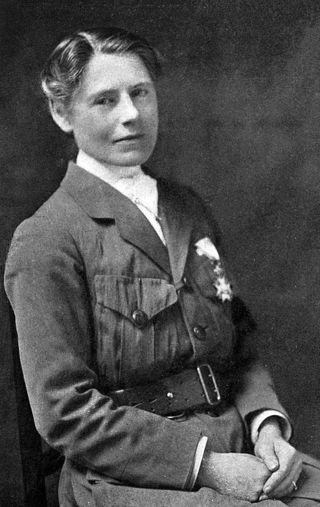
Evelina Haverfield was a British suffragette and aid worker.
Tavistock Goose Fair, known locally as the Goosey, or Goosie, Fair, is the annual fair in the stannary town of Tavistock in the west of Devon, England. It has been held on the second Wednesday of October since 1823 and it is one of only three historically established traditional fairs in the UK to carry the name, the other being the larger Nottingham Goose Fair, and the smaller Michaelmas Goose Fayre in Colyford, also in Devon.

Bull running was a custom practised in England until the 19th century. It involved chasing a bull through the streets of a town until it was weakened, then slaughtering the animal and butchering it for its meat. Bull running became illegal in 1835, and the last bull run took place in Stamford, Lincolnshire, in 1839. The practice was not confined to any particular region, with bull runs also documented at Axbridge in the south west, Canterbury and Wokingham in the south east, Tutbury in the midlands, and Wisbech in the east.

Hiring fairs, also called statute or mop fairs, were regular events in pre-modern Great Britain and Ireland where labourers were hired for fixed terms. They date from the time of Edward III, and his attempt to regulate the labour market by the Statute of Labourers in 1351 at a time of a serious national shortage of labour after the Black Death. Subsequent legislation, in particular the Statute of Apprentices of 1563, legislated for a particular day when the high constables of the shire would proclaim the stipulated rates of pay and conditions of employment for the following year. Because so many people gathered at a fair, it quickly turned into the major place for matching workers and employers. Hiring fairs continued well into the 20th century, up to the Second World War in some places but their function as employment exchanges was diminished by the Corn Production Act 1917. This legislation guaranteed minimum prices for wheat and oats, specified a minimum wage for agricultural workers and established the Agricultural Wages Board, to ensure stability for farmers and a share of this stability for agricultural workers.
Robert Oke, H.M. was the first chief inspector for the Newfoundland Lighthouse Service and served from at least 1848 to 1870. Oke installed the first light mechanism at the Cape Bonavista Light in 1842, and installed the famous Isle of May light mechanism at the Cape Pine Light in 1850, which was later moved to Harbour Grace Island and finally to Cape Bonavista, where it can be viewed today.
England traditionally celebrates a number of Christian and secular festivals. Most are observed throughout the country but some, such as Oak Apple Day, Souling, Rushbearing, Bawming the Thorn, and Hocktide, are local to certain regions.

The Statutes Fair is an amusements fair held in Burton upon Trent, Staffordshire in England. It is held annually on the first Monday and Tuesday after Michaelmas. The fair has been held since 1219 but, despite its name, no statute allowing for it has been found. The event was originally a hiring fair, with employers giving a symbolic shilling to employees contracted for the following year. Amusement stalls began as a means of persuading the employees to spend their shillings. The event is now entirely an amusements fair. It has survived several attempts at abolition and ran, in a reduced form, through the Second World War and COVID-19 pandemic.
References
- 1 2 3 4 Roud, Steve (2006). The English Year. London: Penguin Books. pp. 385–387. ISBN 978-0-140-51554-1.
- 1 2 Hutchins, John (1815). The History and Antiquities of the County of Dorset. Vol. 4 (2nd ed.). London: W Bowyer and J Nichols. p. 77.
- ↑ Hassall, Rachel (10 October 2017). "Sherborne's Pack Monday Fair : A Shirburnian's eye view of the Pack Monday Fair – in poetry, prose and pictures". The Old Shirburnian Society. Retrieved 18 December 2021.
- ↑ Hone, William, ed. (1878). The Every Day Book : or, A Guide to the Year. Vol. II. London: William Tegg. pp. 654–655. The book is a compilation of articles originally published weekly from January 1825 to December 1826.
- ↑ Simpson, Jacqueline; Roud, Steve (2000). A Dictionary of English Folklore. Oxford: Oxford University Press. pp. 312–313. ISBN 0-19-969104-5.